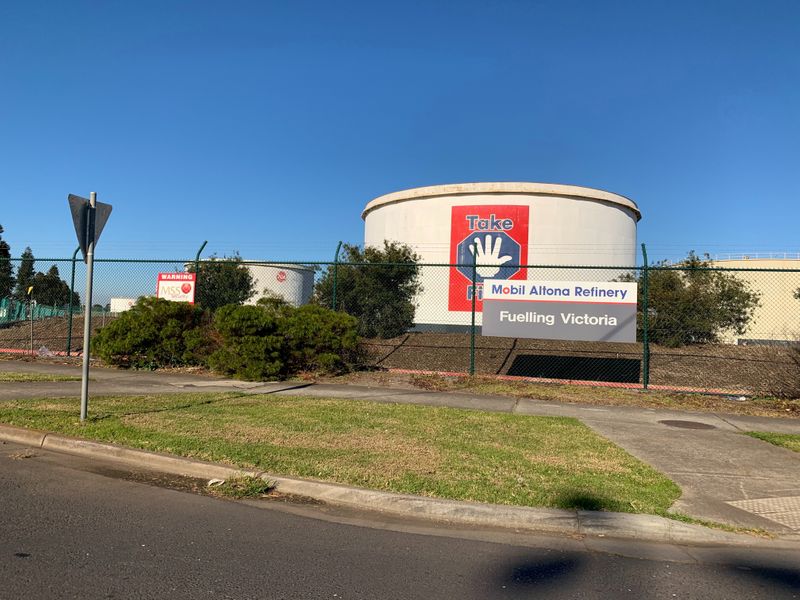By Koustav Samanta and Sonali Paul
SINGAPORE (Reuters) - Asian fuel exporters are hungrily eyeing Australia as the country's shutdown of almost all its refineries creates a bright demand spot amid otherwise coronavirus crimped markets.
China appears to be best placed to take advantage of the opportunity, industry sources and analysts told Reuters, potentially leapfrogging the current top suppliers Singapore and South Korea in the scramble for a piece of the action.
Australia, already the region's largest fuel importer, will likely boost imports by a third next year to 630,000 barrels per day (bpd), according to energy consultancy FGE.
"We expect most of the fuel imports to come from Chinese refiners, due to Chinese officials' continued increase in refined products export quotas and the 600,000 bpd (barrels per day) expansion to Chinese refinery capacity in 2021," said Julie Torgersrud, an analyst at consultancy Rystad Energy.
"New, high-complexity refinery capacity starting up in China puts increased pressure on competing refiners in the Asia Pacific region, who are suffering from lower margins and usually have older, less efficient operations."
GRAPHIC: Australia fuel sales, imports & production since 2015 - https://fingfx.thomsonreuters.com/gfx/ce/yzdvxedxypx/AustraliaFuelStatsSince2015.png
China's refinery capacity is forecast to increase by 1.5 million bpd over the next two years, according to Rystad, compared with a net reduction of 1.2 million bpd across the Asia Pacific over the same period.
"We have exported diesel and gasoline to Australia before but it wasn't as economical as selling into Southeast Asia," a trader with a Chinese refiner told Reuters. "If demand rises with refinery closures and push up prices, then we'll export more."
There are only three oil refineries still operating in Australia after four shutdowns over the past decade, spurred by declining financial viability amid the growth of large-scale, export-oriented refineries throughout Asia and the Middle East.
Exxon Mobil Corp (NYSE:XOM)'s decision to close its 90,000 bpd plant in Victoria state later this year will leave just two, owned by Ampol Ltd and Viva Energy, which will meet less than 25% of the country's almost 1 million bpd annual fuel consumption.
Ampol's Queensland refinery and Viva's Victoria plant have a combined production of about 87,000 bpd of diesel, a meagre 17% of Australia's consumer sales of 509,000 bpd last year, a Reuters analysis of government and companies data showed.
Potentially adding to the squeeze, Ampol is reviewing the future of its refinery with a decision expected by June.
GRAPHIC: Australia annual fuel sales, imports & production since 2010 - https://fingfx.thomsonreuters.com/gfx/ce/nmovarklxpa/AustraliaFuelSince2010.png
Australia is heavily reliant on diesel to fuel its robust mining and trucking sectors, and diesel accounts for over half the country's refined product imports.
To boost energy security, the government is planning to increase the minimum level of national diesel stocks, which averaged 1.4 million tonnes (10.2 million barrels) in 2020, by 40% by 2024.
Diesel imports will likely rise to 430,000 bpd by 2022, compared with an average of 360,000 bpd in 2019, prior to the pandemic, FGE said. Gasoline imports, meanwhile, are forecast to rise to near 200,000 bpd by 2022, compared with 115,000 bpd in 2019.
SOUTH KOREA VS CHINA
Singapore and South Korea are currently Australia's top two fuel suppliers, but face an uphill battle to stay above third-placed China. Suppliers like S-Oil Corp are likely to find any gains capped by the large volumes of un-pledged production from China's new refineries, two Korean traders said.
"S-Oil is one of the top exporters into Australia but competition is getting stronger, as China diesel into Australia is increasing," said a Chinese company official, who declined to be named.
S-Oil is more hopeful of picking up the slack in the gasoline market. The company started selling 98-octane premium gasoline into Australia in December in anticipation of increased demand following the closure of BP (NYSE:BP)'s Kwinana refinery this month.
GRAPHIC: Australia refined product suppliers in 2019-20 - https://fingfx.thomsonreuters.com/gfx/ce/yxmvjwljjpr/AustraliaRefProdSuppliers.png
China has a major hurdle as it produces oxygenated gasoline, while Australia requires non-oxygenated gasoline.
"It's definitely an opportunity but the grades used in Australia are different from China's and there's a local requirement to have your own storage facilities so we're still exploring the market," said an official with a Chinese state refiner.
IMPORT BATTLE
In Australia, companies are jostling to take best advantage of the anticipated surge in imports.
In Western Australia, BP is converting its Kwinana site into an import terminal that is scheduled to open next year.
Ampol, which previously drew supply from Kwinana, said last month it was considering buying Puma Energy's import terminal, as well as beefing up its Singapore-based trading business.
"Clearly we've seen two refinery closure announcements already and that triggers change right across the buy/sell or the refinery swap arrangements," Ampol Chief Executive Matthew Halliday told analysts last month.
GRAPHIC: Australia fuel stocks - https://fingfx.thomsonreuters.com/gfx/ce/nmovarjyopa/AustraliaFuelStocks.png
Viva, another Kwinana customer, has said it is considering whether to buy imported fuel from BP, or shift to importing directly.
In Victoria, where Viva's Geelong terminal and Exxon's Altona facility supply all of the state's needs, Viva said it sees opportunities to expand its refinery once Exxon exits production.
Exxon told Reuters it planned to use its global manufacturing, supply and trading operations to meet the needs of Victoria's consumers.
Imports from Exxon's refineries in Singapore would likely fill the gap, said Serena Huang, Asia lead analyst at data analytics firm Vortexa.
"This is likely to provide a boost to medium-range tanker demand and freight rates along the route," she added.
